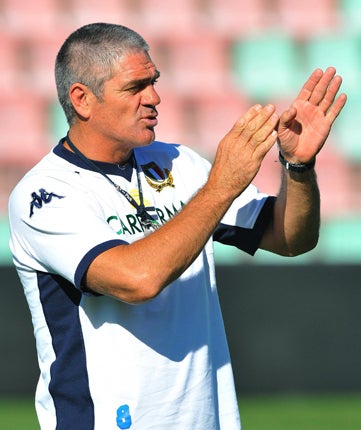Peter Bills: Sobering assessment of northern hemisphere rugby
Talking Rugby

Italy’s South African-born coach Nick Mallett recently spelled out the harsh facts of world rugby life to a failing northern hemisphere.
Mallett’s strong views came after a November Test series of southern hemisphere supremacy that has left the northern hemisphere countries covered by a blanket of gloom, not to mention snow.
“Even your international teams would struggle to beat the top four or five sides in Super 15 rugby” Mallett told me. “There are far too many average games in northern hemisphere rugby. Even in competitions like the Heineken Cup, the French Top 14, the English Premiership and the Celtic League, you can lower your guard in any of those games.
“There isn’t the same speed, intensity, precision of execution demanded as in Super 15. There, any side can turn over anyone else as we have seen. The Sharks lost their first four games last season but then won their next seven. Then there’s a side like Otago who might lose two or three on the trot but then win the following two against anyone.
“There is no easy game anywhere in that Super 14 competition and the fact that they have to play over three months against very high quality teams every week with perhaps seven or eight internationals in them, demands a really good effort just to win a game.
“That breeds a lot of competitiveness. Then there is the speed and skill we see in the Super 14 which translates into the Tri-Nations. OK, if you reach the semi-final of the Heineken Cup and have a match like Toulouse v Munster, that starts getting up to that Super 14 level. But too many games in the northern hemisphere are not at that standard at all.
“There isn’t the same speed or pace and the hits are not as hard.
“For me, the Super 14 standard is definitely up there with the level of international rugby in the northern hemisphere. A good Sharks or Stormers side would give a really good game to Wales, England, Ireland, Scotland or France.
“I’m not saying they would automatically beat them but it would be a bloody close game. There is not a lot of difference between a well drilled, well coached Super 14 side in the top four or five and the northern hemisphere Test teams.”
This sobering assessment of the growing chasm between the two hemispheres echoes the views of Springbok coach Peter de Villiers earlier this year. Then, he explained his reluctance to choose many northern hemisphere based players because, like Mallett, he refused to accept that standards there matched those of the southern hemisphere in terms of intensity.
Thus it was, I watched several of last weekend’s Heineken Cup matches with Mallett’s views very firmly in mind. Was there sufficient intensity? Well, you could hardly accuse the Munster or Ospreys players who snarled and fought each other for 80 minutes at Thomond Park, of lacking such a quality.
But precision, execution at the vital moments? Now, this is where Mallett’s points ring true. So often in northern hemisphere rugby, at all levels including internationals, sides produce a fine piece of skill, create an opportunity – but just cannot finish it off.
Put a northern hemisphere team inside an opponent’s 22 and they reach for the blunderbuss to smash their way to the line. No subtlety of execution, no invention, no vision. Just give it to the apes up front and get them to hurl themselves against the defensive wall.
And do you know why they so consistently fail to score? Because predictable attack of that nature is so much easier to defend against if you are properly organised defensively. It’s the clever opening up of space out wide, the perfectly timed reverse pass that wrong foots an entire defence or the pinpoint accurate cross-kick that does the damage. But too few teams in this part of the world possess those skills.
Northampton gave one example of how to do it against Cardiff. Stephen Myler’s cross-kick to the corner was perfection. It dropped over the covering wing and landed in Chris Ashton’s arms. OK, inexplicably, Ashton dropped it and a simple try was missed. But you had to applaud the precision of Myler’s beautiful, perfectly weighted kick. Nine times out of ten it would have created a try.
Ulster and Bath both reinforced Mallett’s point in their Heineken Cup game. Elementary errors riddled the play, many of a schoolboy nature. How professional players, many of whom are paid six-figure salaries, cannot even give and time a pass properly, bewilders me.
And now a postscript for the truly blinkered, the real one-eyed. I am NOT saying for one moment (and nor is Nick Mallett) that every game everywhere in the southern hemisphere is always perfect and full of brilliant skills. Far from it; like you, I’ve seen some shockers down there.
But you have to generalise to an extent. And Mallett is right. The very fact that five of the six World Cups to date have been won by southern hemisphere countries tells you something.
But until the players in this part of the world understand that, no matter how much money they are being paid here, their skills are still inferior to others and that they must work harder to improve them, nothing much will change.
Subscribe to Independent Premium to bookmark this article
Want to bookmark your favourite articles and stories to read or reference later? Start your Independent Premium subscription today.

Join our commenting forum
Join thought-provoking conversations, follow other Independent readers and see their replies